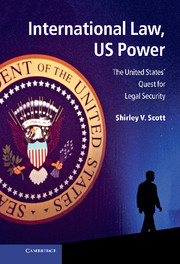Book contents
- Frontmatter
- Contents
- Acknowledgements
- Introduction: beyond the myth of the golden age
- 1 The US quest for legal security
- 2 The US pursuit of legal security through the evolution of the international law of dispute resolution
- 3 The US pursuit of legal security through the evolving regime relating to the use of force
- 4 The US pursuit of legal security in substantive policy arenas
- 5 Techniques through which the United States has reconciled its practice of offensive legal security with the principle of sovereign equality
- 6 The practice of offensive legal security in US diplomacy
- 7 The future of US engagement with international law
- Appendix
- Select bibliography
- Index
- References
1 - The US quest for legal security
Published online by Cambridge University Press: 05 June 2012
- Frontmatter
- Contents
- Acknowledgements
- Introduction: beyond the myth of the golden age
- 1 The US quest for legal security
- 2 The US pursuit of legal security through the evolution of the international law of dispute resolution
- 3 The US pursuit of legal security through the evolving regime relating to the use of force
- 4 The US pursuit of legal security in substantive policy arenas
- 5 Techniques through which the United States has reconciled its practice of offensive legal security with the principle of sovereign equality
- 6 The practice of offensive legal security in US diplomacy
- 7 The future of US engagement with international law
- Appendix
- Select bibliography
- Index
- References
Summary
The more I study the history of American foreign policy, the more deeply convinced I become that our national foreign policy tradition has much to teach us. We don’t just draw lucky cards; we also play the game well. Over two hundred years we have developed our own unique style, which suits us. Certainly it has enabled us to become the richest and most powerful nation in the history of the world.
Walter Russell Mead, 2001It has often been observed that the United States is a country built on law. Justice Anthony Kennedy has noted that Americans were given ‘a self image, a self identification, a self understanding about who they are’ from the Declaration of Independence and the Constitution. Rivkin and Casey referred to the United States as ‘a nation bound together not by ties of blood or religion, but by paper and ink’. Paul Kahn has described the importance of law to the national sense of identity; according to Kahn it is participation in the legal system that unites the United States into a single community. ‘The rule of law, for us, is not simply a matter of getting the content of rights correct. It is first of all an expression of our sense of ourselves as a single, historical community engaging in self-government through law.’ According to Allott, ‘American law is not merely one social system among many. It is the central instrument of the self-constituting of American society.’
Some observers of the predominant place of law in US culture believe that law provides a kind of ‘cultural glue’, binding together a diverse nation and ‘serving as a focus of values and aspirations that define the American people’.
It is not just that the legal dimension of affairs is particularly prominent in the United States, not just that people turn to the courts more often, on more matters, than elsewhere. Americans turn to the courts with a particular kind of faith, and hope, which survives at a deep level despite all the disappointments and frustrations of the legal process.
- Type
- Chapter
- Information
- International Law, US PowerThe United States' Quest for Legal Security, pp. 9 - 46Publisher: Cambridge University PressPrint publication year: 2012



